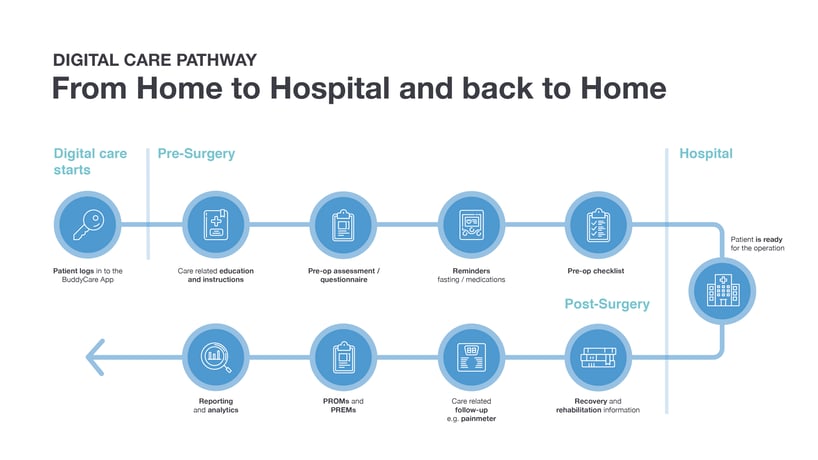No matter the reason a person lands in the hospital to be operated on, certain steps must be taken in the pre-op process. This section of the patient care pathway encompasses a wide range of tasks and personnel efforts. Communication between all parties involved in the preparation plays an important role in this process.
Starting with scheduling the surgery, through diagnostics and planning, recording and transmitting important data, to the equally important post-op care. In order to manage all these components in the right order and in the right time window, interdisciplinary cooperation as well as structure and organization are required. However, there is often a lack of continuous patient care, as there are many changes in patient contact between different providers and disciplines within a care pathway.
Patients’ care pathways and communication can be digitized and automated
What a great relief it would be to simplify and centralize this patient flow by automating most of the steps?
Then there would be more time for real interaction with the patient, instead of wasting time on the phone or on tedious rework of missing documents. The intersections of communication can be largely digitized, so that the communication channel between patient and treatment team is always secured, and important information is guaranteed to flow back and forth at the right time. Such a process digitization would ensure a continuous workflow and, through synergy of the transfer points of data and documents, significantly increase the efficiency potential in terms of time and resources and reduce error potentials, such as cancellation of a procedure due to an inadequately prepared patient.
Surgical preparation and recovery follow-up can be optimized
What is involved in surgical preparation?
The basic perioperative process consists of many important tasks that must be completed without exception in order to meet all the requirements for performing the surgery. Starting with diagnostics and setting a surgery appointment, preparation using different background questions or forms relevant to the procedure, patient education and surgery, to follow-up care and evaluation of results. Last but not least, data on patient satisfaction, patient experience and also enhanced recovery time (ERAS) are of increasing importance. Waiting times, unwanted postponements, cancellation of a scheduled surgery are not only nerve-wracking and unpleasant for the patient, but also costly and time-consuming for a clinic or hospital. If the requirements and sequence of procedures are not structured, important information can be lost and costly unwanted cancellations, no-shows or delays can occur.
And what does digital OR preparation look like?
The goal is to simplify the capture and use of information. This can also be achieved by integrating an existing patient portal, where information already recorded by the hospital information system (HIS) can be incorporated and relevant basic data checked. In this way, the query of required data as well as the exchange of documents, independent of telephone and paper, can take place digitally with the patient. The creation of such a communication portal in which all important information is available is the key to an effortless process for patient and treatment team. Starting with checklists for qualifying patients for pre-op, to anamnesis questions, to different types of documents from general privacy statements to specific OR information.
Remote patient monitoring offers 360 degrees at-a-glance view of care progress and activities
Digitization of the processing process offers so-called quality gates that control the flow of information and provide confirmation of completed steps and results. In this way, the proceeding to the next step in the patient care pathway is decided on the basis of quality criteria that are clearly defined in advance. A data check is performed and red flags automatically appear for the treatment team if certain components or tasks have not been completed. For example, has the patient provided his or her nursing history, entered his or her home medications for easy retrieval by the treatment team, or even remembered to discontinue anticoagulation medications? If not, the system reminds her or him so he can move forward on the digital care pathway. In addition, timed smartphone reminders are automatically sent to the patient about surgery and other appointments or tasks, as well as what to bring or prepare. Information sheets and flyers can be provided clearly and centrally, and patients are well informed. Doctor's letters, findings, images, etc. can also be transmitted digitally and stored centrally, so that the internal effort for administration is reduced and workflow control can run seamlessly. This digital channel between patient and hospital can gradually also be used for appointment allocation, as well as for feedback, reminders, confirmations, notifications and other communication requirements.
If important components of the perioperative process can be standardized and centralized, and also automated through digitization, and if advance provision of information is also ensured, there is (almost) nothing standing in the way of a seamless patient journey. And this makes both surgery preparation and recovery follow-up a breeze. For patients and treatment team alike.
Energy that is available for cohesion and the joint fulfillment of tasks is called synergy. And this can and must be supported and promoted by the digitization of perioperative processes.

About Buddy Healthcare
Buddy Healthcare is a European-based digital health company automating hospitals' care coordination and patient communication processes. The company was founded in 2016, and the care coordination platform was co-created in collaboration with university hospitals. The company initially started producing intelligent and automated surgical care pathways, but it has rapidly expanded to other medical specialties. The BuddyCare software has the Medical Device Class I CE mark and is GDPR and HIPAA compliant. Also, the company's QMS is ISO 13845:2016 Certified.




